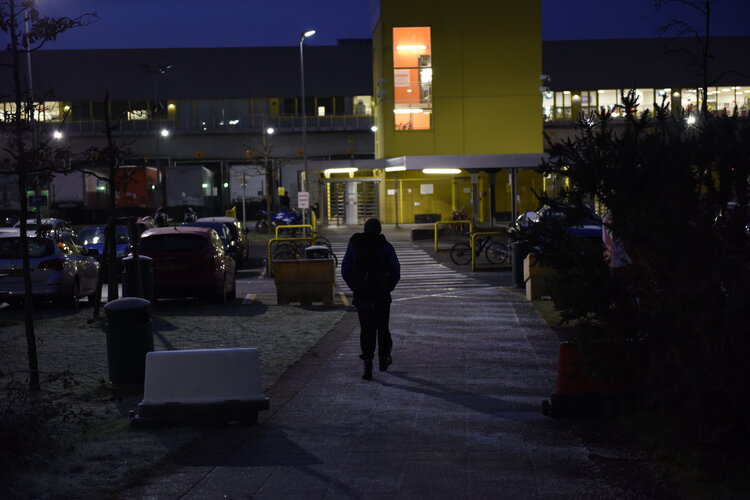
What Action Can You Take to Refuse Work and What Are the New Covid Rules in Wales?
IN A TELEVISED ADDRESS ON SUNDAY EVENING, AND WITH JUST 12 HOURS NOTICE, TORY PM BORIS JOHNSON GAVE THE GREEN-LIGHT FOR MANUFACTURING AND CONSTRUCTION BOSSES IN ENGLAND TO FORCE WORKERS BACK ON SHIFT FROM MONDAY, SPARKING A FURIOUS BACKLASH FROM UNIONS ABOUT SAFETY AND THE THREAT TO LIFE POSED BY COVID-19.
WHILE THE STATEMENT DID NOT APPLY TO WALES, FIRST MINISTER MARK DRAKEFORD ON MONDAY SAID THERE IS ‘NOTHING DIFFERENT’ BETWEEN WALES AND ENGLAND WHEN IT COMES TO RULES AROUND WORKING, MEANING EMPLOYERS HERE COULD TRY TO PUSH PEOPLE BACK TO WORK AS WELL.
THIS IS THE WORRYING SITUATION FACING WORKERS IN WALES AND WHAT ACTION THEY CAN TAKE AGAINST BEING FORCED INTO UNSAFE WORK.
A worker going into Amazon, Swansea. Image by Veronika Merkova
Will Workers in Wales be Forced Back Into Work?
Speaking after Johnson’s televised address, which also laid out a number of other measures around easing lockdown in England, Welsh First Minister Mark Drakeford said the PM was setting out the “minor changes which are proposed to the lockdown rules in England over the next three weeks.”
“I set out the modest changes to the stay-at-home regulations we are making in Wales on Friday,” he said. “Our advice has not changed in Wales. Wherever you can you should stay at home”
While the ‘Stay Home’ part of the UK Government’s advice has been dropped on its posters and replaced with the deliberately less specific ‘Stay Alert’, Wales is keeping the message of staying home central. One major area of divergence is that in Wales, you cannot drive to beauty spots in your car whereas in England you will be able to do so from Wednesday.
But less clarity has been given on whether or not employers in Wales can now follow Johnson’s advice and ‘actively encourage’ workers in construction, manufacturing and jobs unable to be done from home to go to work. Because Johnson’s announcement does not apply to Wales, bosses here should act no differently this week than they did last week.

But in his press conference on Monday, First Minister Mark Drakeford said there was ‘nothing different’ with England on advice around working in Wales, except a ‘difference in tone’ in the way Johnson had “encouraged people to go back to work”. He also pointed to the two metre rule and said workers should check with their employer if they had to travel across the border for work.
In March, Wales instigated a two metre rule, meaning business could re-open provided they observed physical distancing. In April, the Aston Martin plant in St Asaph opened, in spite of Welsh Government’s own admittance that Covid-19 still poses a significant risk to life. On Monday, construction work re-started at two major school projects in Carmarthenshire after it been put on hold due to Covid.
The situation leaves workers in Wales vulnerable to exploitative employers seeking to capitalise on the uncertainty and put workers at risk. Some may be forced to go into work and these will usually be lower paid workers.
Shavanah Taj, General Secretary of The Wales Trades Union Congress (TUC) said the Prime Minister’s statement was “reckless” and would cause a “lot of confusion and anxiety” for people in Wales.
“Workers have to know they won’t put themselves or their families at unnecessary risk” she said, calling for ‘tough new rules on workplace safety’ before things could return to normal.
The People’s Assembly Wales have published a set of demands on Welsh Government, endorsed by Leanne Wood AM that says businesses must “only open up if the union and their members agree it is safe to do so.”
The impact of Johnson’s statement was swift, and highlighted the real dangers involved with a return to work. Writing on her way to her shift, nurse Emma Rans, who works for major London health trust, said:
“Day one and my bus is full. Social distancing not possible therefore non-existent. Last week there was max 2 or 3 people on the top deck. Today there are 21. I don’t feel safe and surely the other 20 can’t either? I am a nurse. I have to go to work. I don’t have a choice and that’s OK. But everyone else now forced to make that choice because of an incredibly dangerous decision made by a Tory government who care more about the economy.”
Unite, Wales’ biggest union for manufacturing and construction workers, said yesterday that they will “not recommend a return to work for their three million members until the government and employers agree a nationwide health and safety revolution as a result of the #Covid19 pandemic.”
What Action Can be Taken by Workers to Protect Themselves and Others?
But many trade unions have stopped short of calling action that could halt the Prime Minister’s drive to get people back into work. Speaking to Radio 4 on Monday morning, Len McCluskey, Unite General Secretary, said that if union reps and stewards tell members that their workplace is unsafe, they should refuse to go in.
But Ian Allinson, a trade union campaigner who previously challenged McCluskey to lead Unite, criticised the union leader, saying “there were still major problems with what he said.”
““It treats the issue as purely one of safety within a particular workplace,” Allinson wrote. “The reality is that the infection is at much higher levels than when the half-hearted lockdown was first introduced. If we want to bring it under control quickly then all non-essential work should stop, with all workers on full pay….he should have opposed [Johnson] outright. ”
In Italy, when the pandemic failed to be brought under control after weeks of lockdown, many pointed to the fact that industry in the North was still continuing as normal. A wave of unofficial strikes in Amazon, Fiat and other workplaces forced the government to eventually close them.
In a stronger stance than many unions, the NEU in England are instructing members not to return to work or engage in planning operations for schools to re-open in June, following Johnson’s statement that this was the government’s intention.
Across Britain, there has been a wave of largely unreported lighting strikes that have gained quick results. Done together with a large enough group of workers, mass walkouts with a clear set of demands over a specific issue can force bosses into quick concessions. “Strong union organisation and workers’ collective confidence are necessary to allow workers to say to their employers ‘put people before profit,” wrote Gregor Gall, a professor of Industrial relations at Leeds University, in a recent article, adding: “Some workers have recorded success in getting what they want by simply making the threat.
On Twitter yesterday evening, Jonny Jones, a PhD researcher on trade unions, wrote in response to Johnson’s statement that everyone should join a union but they could also take immediate action and refuse to work on safety grounds:
Totally agree with everyone saying 'join a union' tonight. But you can also refuse to work for safety reasons. Talk to your workmates about doing it. You can take action under Health and Safety law without a ballot or giving your employer the right to dock your pay… 1/7
— Sioni Esgyrn (@JonnyJonez) May 10, 2020
Section 7 of the Health and Safety At Work Act 1974, he explained, places a duty on every employee while at work ‘to take reasonable care for the health and safety of himself and of other persons’ at work.’
In addition, Section 44 of the Employment Rights Act 1996 protects workers, regardless of length of service, from any ‘detriment’ – such as being sacked or docking pay – “in circumstances of danger which the employee reasonably believed to be serious and imminent and which he could not reasonably have been expected to avert.” The legislation also allows workers to take ‘appropriate steps’ to protect themselves or others from danger, specifying that this includes leaving work and refusing to return while the danger persists.
According to the Labour Research Department: “As long as the employee forms a genuine view of a risk that they reasonably regard as serious and imminent, the fact that the employer disagrees with the seriousness of the risk or the appropriateness of the steps taken is irrelevant.”
Writing last night, the trade union official @charlottor gave detailed advice to people who were being told they now had to go into work for the first time since the lock-down began.
Gone unlocked to state the following:
— Magic Money Tree 🌳 (@charlottor) May 10, 2020
* Familiaraise yourself with s44 of the Employment Rights Act 1996.
* If you do not feel safe to go to work and you are an employee – then do not go. State your reasons in writing and send an email to your manager, cc-ing HR (1/?)
The union official gave out the advice in series of tweets:
- Your email should outline solutions for making you feel safe at work and/or specify what you want to happen. Be clear you expect a written response & reference your statutory rights.
- Talk to your workmates you know you can trust. Set up a WhatsApp group or something without involving management. Would they sign up to send a similar email? You have strength in numbers.
- Ask for copies of risk assessments the employer has undertaken. What risks have they identified and how will the risks be reduced? Has the assessment been carried out by a health and safety pro or someone who doesn’t know what they’re doing?
- If you are a member of a union, contact your rep/organiser/officer and tell them what you’re doing. If you’re not in a union, join the one relevant to your job TONIGHT. Contact me if you don’t know what union that would be & I’ll help.
- Solidarity is all we have. You CANNOT rely in your employer to do the right thing…Don’t allow them (be they government, landlords or bosses) to tell you that you can have no control over your own life. We all deserve better & we win better by fighting for it.” ✊️
The true dangers in forcing people back to work when the virus is not under control and World Health Organisation guidance on testing has not been put in place are largely unknown. But with hundreds of workers in health, social care and transport having already died from exposure to Covid, people may feel they have little choice but to refuse to go into work or take collective action with their co-workers. This might not just be about their own safety, but the health of society at large.

